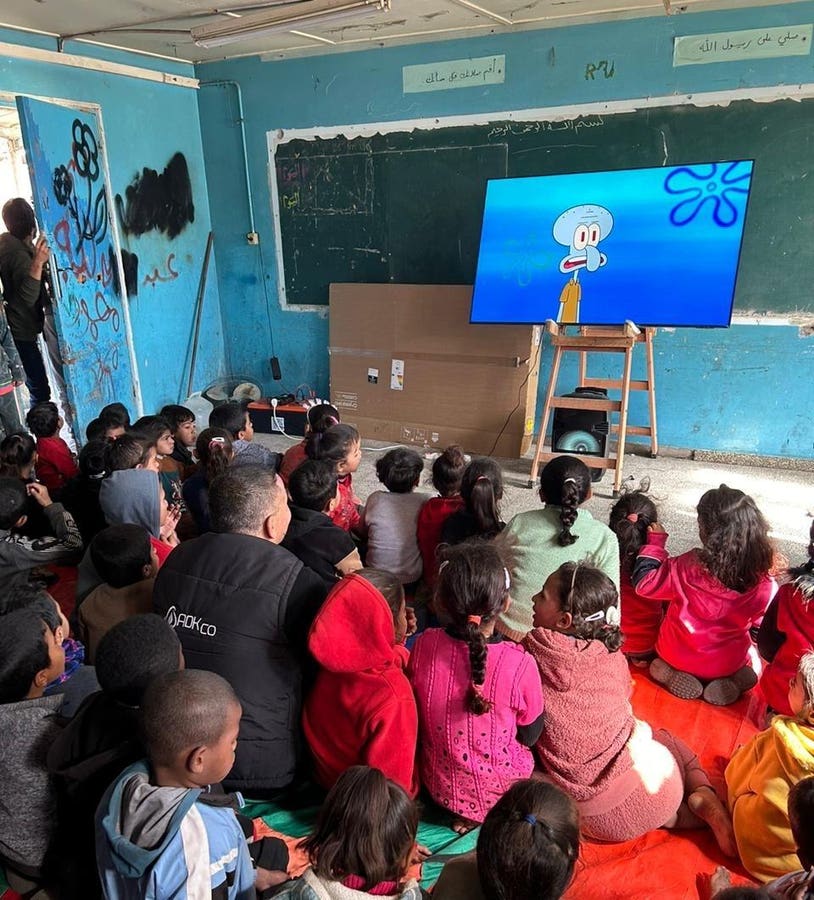dog on the phone with a can
getty
Decades ago, an organization may have been founded on clear principles, but today, internal divisions and external pressures have frozen narratives. Despite continuous management efforts, complex internal stalemates endure. Positions have hardened; narratives remain entrenched. Yet, amid this inertia, a new possibility is emerging.
Artificial intelligence which has long been a technical tool, but since the rise of ChatGPT in 2022 it has become a cultural phenomenon. It might now be repurposed for something acutely human: as a cognitive compassion curator, capable of decoding and bridging divides that traditional management alone has failed to close, provided it is pursued in the form of AI-systems that are tailored, trained, tested and targeted to bring out the best in and for people and planet, or, prosocial AI.
The Limits Of Linguistic Translation
We’ve grown accustomed to AI’s ability to translate words across languages with increasing sophistication. But organizational conflicts reveal the inadequacy of mere linguistic translation. When a finance executive speaks of “cost rationalization” and “shareholder value,” and an R&D counterpart responds with “scientific integrity” and “long-term innovation,” their words differ but the deeper disconnect is elsewhere: in diametrically opposed frameworks of meaning, organizational agendas, and professional identity.
The typical corporate dispute isn’t about language but incompatible emotional narratives that have calcified over years of siloed operations. One side might view a merger as a peaceful reclamation of market territory and synergy, while the other frames the same event through the lens of anti-worker struggle, viewing the acquiring entity as an occupier that will eliminate jobs. Both sides possess sophisticated arguments, data-driven evidence and genuine grievances. Both feel existentially threatened by the other’s position. These perspective clashes are becoming acute in a context where the mainstreaming of AI brings up heated debates around the redundancy of human expertise. Ironically this context is also where AI’s potential as a mindset translator could reveal intriguing opportunities.
AI’s Perspective Potential
Envision an AI system designed not to declare winners in a merger dispute, but to faithfully reconstruct the internal logic of opposing viewpoints. Such a system would help a management team understand not just what the union counterpart says, but why their position feels morally imperative from within their collective experience. It would help the operational team grasp how strategic decisions emerge from centuries of documented governance patterns, not mere profit ambition.
This process is about creating cognitive compassion — the ability to understand how someone else’s worldview operates, even when you completely disagree with it and to feel compelled to find a solution that accommodates their needs. A cognitive compassion curator translator that is powered by prosocial AI could help negotiators articulate their own positions in ways that do not trigger verbal landmines. More interestingly, it can coach them to present their opponents’ position in ways those counterparts would actually recognize as accurate. This is the ultimate litmus test of true understanding.
Twisted Twins: AI As Polarization Amplifier
AI is a tool with tragic duality. Already the same assets that could foster cross-perspective understanding are being weaponized to do the opposite. Research on filter bubbles and organizational echo chambers reveals how algorithmic recommendation systems systematically starve information diets. The more accurately a recommendation engine predicts your interests, the faster it traps you, creating degenerate feedback loops.
In a business context, this manifests as acquired employees receiving endless content affirming the strategic independence of the former entity, while acquiring employees see only material validating the need for deep integration. AI-powered content curation reflects existing divisions, but worse, it actively reinforces them. These bubbles contribute to the calcification of positions; negotiable disagreements turn into incompatible professional identities, where compromise feels like betrayal. (Sadly, the same dynamics unfold large-scale in the general political landscape where right and left, conservatives and liberals communicate within their bubbles, with little intention to navigate beyond the comfort zone of their own intellectual habitat).
And it is getting worse. AI-generated content, increasingly sophisticated in mimicking authentic voices, can now produce unlimited quantities of seemingly credible audio-visual material reinforcing any position. In a hybrid environment seeing can no longer mean believing.
A-Frame: 4 Principles To Curate Understanding
How do we bend AI toward bridge-building rather than wall-reinforcement within the organization? The A-Frame offers a practical roadmap, built on four sequential commitments for cultivating hybrid intelligence:
Awareness: Acknowledge Your Informational Echo Chamber. The first step is recognizing that each of us lives in an algorithmically curated reality.
Practical application: Deliberately seek internal sources that challenge your cognitive comfort zone. The goal isn’t conversion but literacy, understanding what the other side actually believes and why.
Appreciation: Recognize Legitimate Concerns Across Divides. Appreciation doesn’t equal agreement. It means acknowledging that opposing positions stem from legitimate concerns, not malice or incompetence
Practical application: Before critiquing an opponent’s position, practice articulating their argument in its strongest, most compelling form.
Acceptance: Embrace Irreducible Differences Without Demonization. Some differences can’t be resolved through better communication. Acceptance means living with that tension.
Practical application: Shift from “Who’s right?” to “What’s workable?”. AI systems can model multiple scenarios simultaneously, highlighting zones of potential overlap where both sides’ non-negotiable interests might coexist.
Accountability: Take Responsibility For Information Ecosystems. Every digital interaction trains the algorithms that shape our organizational information environment.
Practical application: Hold platforms accountable for polarization metrics, not just engagement metrics. Individuals must practice epistemic humility.
Cultivating Cognitive Compassion For A Hybrid Future
In an age where AI can either trap us in professional tribal certainties or help us glimpse the shared humanity in those we oppose, double literacy becomes quintessential. To thrive individually and as an organization in a hybrid intelligence future (arising from the complementarity of natural and artificial intelligences), we need on the one hand human literacy (a holistic understanding of self and society, including our ways of thinking and feeling) and algorithmic literacy (a candid comprehension of the influence of AI on our perception and that of others).
Moving forward, will we design our artificial intelligences to confirm what we already believe, or to challenge us toward deeper understanding? Choosing prosocial AI – AI systems that are tailored, trained, tested and targeted to bring out the best in and for people and planet is a choice. Will be we be courageous enough to make it ?









